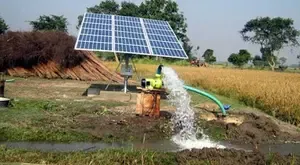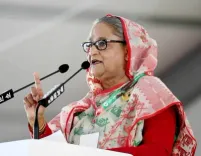Gujarat Government Approves 12,382 Additional Solar Pumps; 7,700 Installed

Synopsis
Key Takeaways
- Over 7,700 farmers have installed solar pumps.
- Subsidies cover 70% of installation costs.
- 12,382 additional solar pumps sanctioned.
- Gujarat leads in residential rooftop solar.
- Strong focus on renewable energy and sustainability.
Gandhinagar, Jan 27 (NationPress) Over 7,700 farmers in Gujarat have successfully set up off-grid solar pumps under the Pradhan Mantri Kisan Urja Suraksha Evam Utthaan Mahabhiyan (PM-KUSUM) initiative as of December 2024, according to official statistics from the state government.
The state has allocated more than ₹218 crore in subsidies to support farmers, which covers roughly 70 percent of the installation costs for solar pumps, thereby alleviating the financial strain on farmers.
By utilizing solar-powered irrigation systems, farmers are not only conserving electricity but also playing a part in promoting environmental sustainability.
The PM-KUSUM scheme, initiated by the central government in 2019, strives to secure water and electricity availability for irrigation while advocating for the use of renewable solar energy. Farmers throughout the state benefit from clean, pollution-free electricity to meet their agricultural requirements.
The central government has authorized the installation of 12,382 standalone off-grid solar pumps in Gujarat by March 2026 under this scheme.
As of October 31, 2024, the total renewable energy capacity in the state (excluding hydropower) is 29,814.36 MW, placing it as the second-largest in India after Rajasthan.
In terms of solar energy, Gujarat's capacity reached 14,182 MW by June 2024. A significant highlight of Gujarat's solar movement is its dominance in residential rooftop solar installations.
Although it occupies only 6 percent of India’s land area, the state contributes to nearly two-thirds of all residential rooftop solar power in the nation.
Geographically, Gujarat enjoys ample sunlight year-round and has extensive stretches of barren land, especially in places like Kutch, making it ideal for large-scale solar projects.
The state has leveraged these natural resources through significant infrastructure developments such as the Charanka Solar Park, Asia's first and largest solar park with over 600 MW capacity, and the Dholera Solar Park, which is set to achieve a capacity of 5 GW, ranking it among the largest globally.









